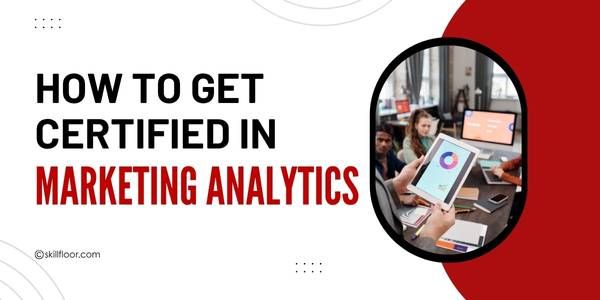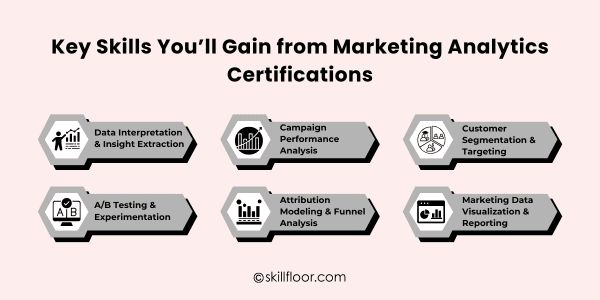How to Get Certified in Marketing Analytics
Advance your marketing career with a certification in marketing analytics. Discover the right courses, step-by-step guidance, and tips to achieve your goals.

Businesses may better understand what is and is not working with the use of marketing analytics. Data analysis frequently reveals the reasons why one product outperforms another. Facebook Insights and Google Analytics are two examples of tools that display what users click, read, and skip. Your emails, advertisements, and website all benefit from these figures. In the world of marketing today, being able to understand this data is now essential.
Analytics are frequently used by marketing professionals to inform their daily choices. Data is used by both small businesses and large corporations, such as Netflix, to determine what works. Now, it's about testing and improving rather than speculating. Tracking outcomes, such as email responses or ad clicks, allows marketers to make smarter decisions that support the expansion of their company.
Because marketing analytics produce actual results, it is simple to believe. You can observe which goods had more clicks or which posts received the most likes. Simple information increases consumer confidence and helps organizations make better decisions.
What is Marketing Analytics?
Analyzing data to determine how effectively the advertisement is performing is known as marketing analytics. It facilitates the tracking of things like email opens, ad clicks, and website visits. Businesses may determine what is and is not working in their marketing campaigns by analyzing these figures.
You may think of it as a report card for your campaigns, posts, and advertisements. You use facts rather than conjecture to determine your next course of action. Regardless of the size of your organization, marketing analytics may help you reach a wider audience, make better decisions, and confidently expand your enterprise.
The Importance of Marketing Analytics
-
Helps You See What Works: Marketing data reveals which advertisements or content your audience finds most appealing. You may avoid wasting time on information that doesn't connect or perform effectively by concentrating on what produces results.
-
Makes Smart Decisions Easier: What works is shown by the numbers. Whether you are editing a message, altering a headline, or selecting a photo, analytics allows you to test many options and make informed decisions rather than relying just on guesswork.
-
Saves Time and Money: Analytics helps you cut down on ineffective advertising. You may concentrate your efforts on what actually produces results, which will improve your marketing performance overall and save you time and money.
-
Understands Customer Behavior: Analytics provides you with information about what your audience likes by monitoring what they click, view, or ignore. This enables you to modify your messaging to better express what your target audience truly wants.
-
Tracks Progress Over Time: Marketing data analysis allows you to monitor your development on a weekly basis. With actual data that directs your activities, it assists you in identifying trends, tracking progress, and refining your digital marketing plan.
-
Build Confidence in Your Strategy: You feel more confidence when you have verifiable evidence to back up your decisions. Analytics helps you defend and explain your strategy, whether you're managing a team or presenting outcomes to a customer.
The Benefits of Getting Certified in Marketing Analytics
-
Builds Credibility: Obtaining certification shows to others your commitment to your skills. It builds your reputation in the marketing industry and helps others trust your expertise.
-
Validates Your Skills: Having a certification attests to your proficiency with marketing data. It shows your mastery of the tools and techniques required to monitor, assess, and enhance marketing strategies.
-
Boosts Career Growth: When recruiting, a lot of companies search for certified specialists. Gaining a certification can help you advance into new positions, improve your chances of getting a job offer, or even confidently request a raise.
-
Makes You Job-Ready: Like a good digital marketing course, most programs emphasize practical tools and real-world work. Reading reports, seeing patterns, and using data to enhance outcomes are all skills you'll acquire.
-
Sets You Apart from Others: With a certification, you stand out in an overcrowded employment market. It shows that you've taken the time and effort to learn and develop, which many hiring managers value.
-
Increases Your Confidence: Gaining confidence through understanding numbers, whether in a marketing program or a data analytics course, is beneficial. You'll be prepared to make data-driven judgments and provide concise explanations of your work.
Top Certifications in Marketing Analytics
1. Google Analytics Certification
Gaining a Google Analytics Certification teaches you how to monitor user activity and website traffic. It's easy to use, free, and gives your insight into what's working on your website so you can make better marketing choices.
-
Level: Beginner to Intermediate
-
Ideal For: Beginners, Digital Marketers, Small Business Owners
2. Meta Marketing Science Professional Certification
Facebook Ads and Instagram Ads may be measured with the use of the Meta Marketing Science Certification. For marketers looking to monitor performance, comprehend data, and enhance ad campaign outcomes, it's ideal.
-
Level: Intermediate
-
Ideal For: Social Media Marketers, Growth Strategists
3. HubSpot Marketing Analytics Certification
The HubSpot Marketing Analytics Certification shows you how to use simple tools to measure and enhance your marketing. Reports, dashboards, and consumer data are covered to assist you in making informed decisions that advance your company.
-
Level: Beginner to Intermediate
-
Ideal For: Digital Marketers, Content Marketers, Small Business Owners, and Professionals.
4. Marketing Analytics
Analyzing data to determine the effectiveness of your marketing is known as marketing analytics. It assists you in determining what works, what needs to be fixed, and how to make campaigns better in the future.
-
Level: Intermediate to Advanced
-
Ideal For: Career Switchers, Aspiring Data Analysts in Marketing
5. LinkedIn Marketing Strategy Courses
Courses on LinkedIn Marketing Strategy teach you how to expand your brand and connect with the right people on the network. You will learn how to run advertisements, write content, and establish long-lasting professional relationships online.
-
Level: Intermediate
-
Ideal For: B2B marketers, LinkedIn Ads Professionals, Digital Marketers Managing Paid Campaigns
6. Digital Marketing Analytics Certificate
You may learn to track and comprehend online marketing data with a Digital Marketing Analytics Certificate. To make better marketing choices and spur development, you'll learn how to monitor website traffic, ad performance, and consumer behavior.
-
Level: Advanced
-
Ideal For: Experienced Marketers, Analysts, Technical Founders
Key Skills You’ll Gain from Marketing Analytics Certifications
-
Data Interpretation & Insight Extraction: Discover how to interpret dashboards, identify patterns, and translate data into understandable actions. This ability enables you to identify what is effective and make more informed marketing decisions that advance actual company objectives.
-
Campaign Performance Analysis: Utilize metrics like ROI, CAC, and conversion rates to assess the success of digital marketing campaigns on various platforms (such as Google, Meta, and LinkedIn).
-
Customer Segmentation & Targeting: Learn how to categorize your audience according to their age, hobbies, or purchasing patterns. This enables you to develop better, more targeted marketing plans and communications that are tailored to the demands of each group.

-
A/B Testing & Experimentation: Discover how to test two iterations of an email or advertisement to determine which performs best. By eliminating uncertainty, A/B testing provides you with concrete evidence of what your audience prefers.
-
Attribution Modeling & Funnel Analysis: Learn how to map the customer journey and determine which steps are most important. Utilize web analytics to monitor user behavior and determine which marketing platforms convert visitors into customers.
-
Marketing Data Visualization & Reporting: Discover how to transform data into understandable reports and graphics. You may display findings in a style that is simple for your team or clients to comprehend and utilize by using tools like Google Data Studio or Excel.
Choosing the Best Marketing Analytics Certification for Your Goals
-
Know Your Career Path: Consider your career goals: strategist, digital marketer, or data analyst. Select a certification that teaches the skills you'll need on the job and aligns with your long-term professional objectives.
-
Check the Course Content: Examine the topics covered in the course. Verify that it incorporates practical abilities like campaign analysis, tracking, data analytics, and reporting. A successful curriculum should educate more than simply theory; it should teach practical skills.
-
Choose the Right Difficulty Level: Do you have any prior experience or are you just getting started? Professionals may want more advanced classes with deeper insights and practical projects, while beginners may seek out fundamental certificates.
-
Look for Recognized Names: Select certificates from reputable institutions or academic institutions. Well-known programs from companies like Google, Meta, or HubSpot are frequently more valuable when applying for positions.
-
Consider Time and Cost: Verify the cost and duration of the course. While some programs need more time and money, others are brief and free. Choose one that works with your schedule and budget.
-
Read Reviews and Results: Look for reviews from people who’ve taken the course. Check to see whether they found it useful and whether it enhanced their abilities or employment prospects. Making informed decisions might be helped by genuine feedback.
Steps to Get Certified in Marketing Analytics
-
Assess Your Skill Level: Take time to assess your current situation before deciding on a plan. Regardless of your level of expertise, knowing what you already know can help you choose a curriculum that suits you.
-
Research and Shortlist Programs: Examine the various certification programs and their offerings. Examine the course content, reviews, and required time. List the ones that fit your learning style, goals, and financial constraints.
-
Check Prerequisites and Register: Basic computer or marketing skills are required for some courses. Verify that you fulfill the prerequisites, then register and save your login information. Remember the due dates and dates for the courses.
-
Create a Study Plan: Break the course into tiny segments and establish daily or weekly goals. Set up time to practice, take notes, and watch lessons. A straightforward timetable lowers stress and helps you stay focused.
-
Take the Exam: Take the test as soon as you're prepared. Keep your cool, read the questions attentively, and provide your best response. Many online tests offer flexibility, including the option to retake them if necessary.
-
Share Your Certification: Update your LinkedIn profile and resume after passing. To show your skills and let people know you're prepared for new marketing chances, you may also publish about it online.
Essential Tools and Platforms for Marketing Analytics
-
Google Analytics 4 (GA4): Are you curious about your website's visitors' demographics, activities, and origins? All of these and more is provided by GA4, which is ideal for figuring out what aspects of your campaigns are successful or unsuccessful.
-
Google Data Studio: Google Data Studio converts statistics into easy-to-read charts and reports. To clearly communicate findings to your team, you may integrate it with additional tools, such as Google Analytics or Ads.
-
Meta Business Suite: Facebook and Instagram advertisements may be tracked and managed using Meta Business Suite. It displays the effectiveness of your articles and advertisements, allowing you to modify your material according to the preferences of your audience.
-
Tableau or Power BI: When you're ready to improve your graphics, use these tools. Imagine dashboards that include data from several sources, update automatically, and genuinely assist your team in making quicker, more informed choices.
-
Excel or Google Sheets: Google Sheets and Excel are easy-to-use tools for organizing and classifying your data. To have a better understanding of your marketing performance, you may utilize them to generate tables, charts, and summaries.
-
HubSpot, Salesforce, or Mailchimp: These solutions let you measure what's converting, automate emails, and keep track of prospects. They keep you data-driven and organized, whether you're managing a campaign or simply maintaining relationships.
Earning a marketing analytics certification may genuinely transform your workflow and perspective. It teaches you how to make better decisions every day, where your efforts are yielding results, and what your audience truly wants. The correct qualification equips you with practical skills that apply to a variety of sectors and professions, regardless of your professional stage. Building a solid foundation and learning at your own pace is now simpler than ever, thanks to the abundance of adaptable, beginner-friendly online programs. In addition to giving you more self-assurance, the skills, tactics, and knowledge you acquire will make you an invaluable member of any team. Begin modestly, maintain your curiosity, and relish the process of learning with a purpose.






























































